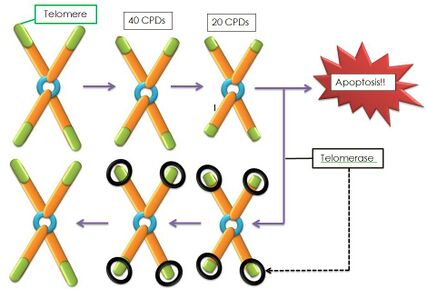Telomere
Original Editor - Lucinda hampton
Top Contributors - Lucinda hampton, Vidya Acharya and Tolulope Adeniji
Introduction[edit | edit source]
Telomeres are repetitive deoxyribonucleic acid (DNA) sequences which cap the ends of chromosomes, protecting them from degradation, note unlike the parts of the DNA they not contain information needed to make proteins. With every cell division the telomere shortens and when a critical telomere length is attained, cellular replication can no longer take place, and it becomes “senescent”. To counter this shortening telomerase plays a critical role. Telomerase is an enzyme in that repairs the telomeres of the chromosomes so that they do not become progressively shorter during successive rounds of chromosome replication. The telomeres themselves in turn are protected by protein complexes called “shelterins”. These shelterins role is to regulate telomerase activity on the telomere and prevent telomerase overactivity to avoid excessive telomere elongation[1].
Does this process mean anything regarding our mortality? Does the fate of individual cells mean that much with telomere shortening counting down the remaining time our bodies have to live? These questions remain to be answered.[2]
Stress and Telomeres[edit | edit source]
Most studies indicate an important role of lifestyle habits on the degree of biological aging, with diet, stress and exercise all playing a part.
- A healthy diet rich in of dietary fiber and unsaturated lipids exerts a protective role on telomere health, whereas high consumption of sugar and saturated lipids accelerates telomere attrition eg mediterranean diet versus a modern western diet. Those effects are likely to be related to oxidative stress and inflammation, as antioxidant and anti-inflammatory properties of nutrients are associated with longer telomeres.
- Physical activity may protect telomeres however no consensus has been reached on the optimal exercise dose. The beneficial effects of physical activity on telomeres could be driven by an increase in telomerase activity following an acute bout of exercise, potentially alleviating oxidative stressors and positively effecting skeletal muscle[3].
- Shorter telomere length is associated with older age and increased disease morbidity and mortality. Emerging studies suggest that stress accelerates the erosion of telomeres from very early in life and possibly even influences the initial (newborn) setting of telomere length[4].
Sub Heading 3[edit | edit source]
Resources[edit | edit source]
- bulleted list
- x
or
- numbered list
- x
References[edit | edit source]
- ↑ Haupt S, Niedrist T, Sourij H, Schwarzinger S, Moser O. The Impact of Exercise on Telomere Length, DNA Methylation and Metabolic Footprints. Cells 2022, 11, 153. Available:https://www.ncbi.nlm.nih.gov/pmc/articles/PMC8750279/ (accessed 23.7.2022)
- ↑ The conversation Tick, tock… how stress speeds up your chromosomes’ ageing clock Available:https://theconversation.com/tick-tock-how-stress-speeds-up-your-chromosomes-ageing-clock-127728 (accessed 23.8.2022)
- ↑ Balan E, Decottignies A, Deldicque L. Physical activity and nutrition: two promising strategies for telomere maintenance?. Nutrients. 2018 Dec 7;10(12):1942. Available:https://www.ncbi.nlm.nih.gov/pmc/articles/PMC6316700/ (accessed 24.7.22)
- ↑ Shalev I, Entringer S, Wadhwa PD, Wolkowitz OM, Puterman E, Lin J, Epel ES. Stress and telomere biology: a lifespan perspective. Psychoneuroendocrinology. 2013 Sep 1;38(9):1835-42.Available:https://pubmed.ncbi.nlm.nih.gov/23639252/ (accessed 23.7.2022)







